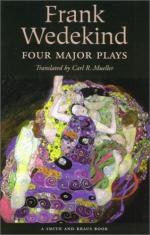|
This section contains 8,158 words (approx. 28 pages at 300 words per page) |

|
SOURCE: "Wedekind's Frosty Spring," in Yale/Theatre, Vol. 6, No. 2, Winter, 1975, pp. 53-70.
In the following essay, Bermel analyzes Frank Wedekind's drama of adolescent life and sexuality in late nineteenth-century Germany, Spring's Awakening.
To Dr. Waldemar Zozo: You, Sir, were the Navy psychiatrist who examined me in Norfolk, Va., about 1942, and told me I was unusually immature. [ knew that, but professional confirmation caused me deep anguish. In anguish I was not immature.
-Saul Bellow, Herzog
If most criticism of Spring's Awakening is on the right track, Wedekind's first play has gone hopelessly out of date. He is said to have deplored the prudishness of German and Swiss-German burghers; to have shown how it inhibited children when they reached puberty; and to have found the inhibitions tragic.1
Since 1891, when the play was written, sex-education has advanced tidally. Recent news reports out of West Germany tell of a Sexwelle, a sex-wave...
|
This section contains 8,158 words (approx. 28 pages at 300 words per page) |

|


